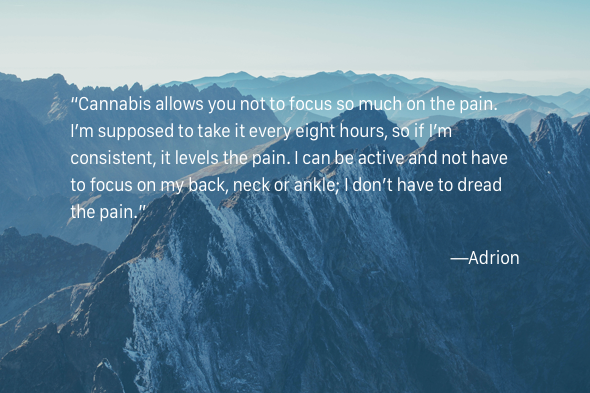Patient: Anne Walters, age 53
**Health conditions: **Fibromyalgia, reflex sympathetic dystrophy, severe chronic pain, anxiety
Solution: CBD via tincture and a vaporizer in combination with 50mg of Topamax and an occasional Motrin
New York’s medical cannabis program currently serves 34,000 registered patients, and Anne Walters has been a certified patient since June 2017. This is her story on how cannabis has helped treat her multiple conditions and neuropathies.
A Long, Hard Journey Before Cannabis
With all that 53-year-old Anne has been through, it’s hard to believe that her journey can be traced back to carpal tunnel syndrome. “In 2003, I was working at a job doing repetitive work,” she says. “When I went to the doctor, I found out I had fibromyalgia, and that I had not only carpal tunnel, but De Quervain’s and tendonitis.”
Anne was a single mother raising three children at the time, balancing the need to work with the reality that the job was doing harm. “I just kept working, and I had no idea that what I was doing to my hands was so bad until I was in a lot of pain.”
A doctor recommended reconstructive surgery on her thumb. “We’re going to pull the tendons from your forearm to rebuild the muscle in your thumb,” she recalls hearing from her doctor, “so I go into the hospital and have three procedures done on this one hand.”
But the surgery made things worse. “I came out with a condition called reflex sympathetic dystrophy (RSD).”
Now on disability, Anne began to suffer from depression and was diagnosed with generalized anxiety by her counselor. Meanwhile, the Elavil she was prescribed to help with the pain caused by fibromyalgia “made me sleep 20 hours, and I put on weight, which caused back problems. I went from 175, fit for a person with my build, to 240 pounds.”
Anne was eventually able to go back to school, but things took a turn for the worse right before she graduated from her master’s program. “I got hit by an ambulance bus and suffered damage to the left side of my body, where I had the RSD and surgery on my hand,” she says. “I sustained injuries to my back, my hip, my neck.”
RELATED: CANNABIS & CHRONIC PAIN: MARGARET’S SUCCESS STORY
A Better Life with Access to Medical Marijuana
Throughout the years, Anne supplemented the advice from doctors with homeopathic remedies. “The only way I was able to improve was doing alternative medicine: herbs, meditation, coming off all that medication and learning how to deal with the pain.”
Anne had been exposed to cannabis’s medicinal qualities thanks to her upbringing. “I come from a culture where marijuana was a cure for so many things,” she explains, “but in the ’80s and ’90s, we shied away from marijuana because it was illegal, and then you don’t know what you’re smoking, you don’t know what’s being put into it.”
Though she knew cannabis might help, Anne couldn’t risk arrest and potentially endangering her health. “You can’t find it pure, and it’s illegal to even grow in your home, so I had to take the medication that doctors gave me,” she says. “I’ve always had that knowledge [about cannabis], but as time goes by you’re forced to conform.”
Once New York approved medical marijuana, she started researching. Through the Department of Health website, she discovered that she qualified for a fee waiver. “I did the certification process in June 2017 and that’s how my life started changing for the better,” she says.
RELATED: WHAT TO EXPECT OUT OF NEW YORK’S MEDICAL MARIJUANA PROGRAM
Anne knew things were different the first time she visited PharmaCannis’ Hunts Point dispensary. “They walked me through it when I first went to them and got the medication,” she recalls. “No matter how many times I called them, they took their time and told me how to take [cannabis] and which was the best way to use it. They made me feel really confident and that I was in full control of what I was doing.”
Anne especially appreciated the dispensary’s one-on-one approach with patients. “There’s so much privacy, it’s absolutely clean—that’s big for me because some facilities, it’s just about the money,” Anne explains, referring to other dispensaries that felt more like cattle calls.
“There’s no crowding [at PharmaCannis]. They’re very polite; they answer all my questions, take their time. I can talk to them about anything and call them any time. They’re just constantly professional, and you want to go back. I’m going to apply for a job with them,” she chuckles.
Cannabis for Pain & Multiple Neuropathies

Anne is taking CBD via tincture and a vaporizer. “It lessens the spasms and cramps that I get which take over my hands and they’re stuck for a minute,” she says, comparing the experience to a mini stroke. “I’m not getting that anymore. Cannabis doesn’t take [the spasms] away permanently, but it controls them. It’s wonderful.”
Cannabis has also greatly improved Anne’s mobility. “It helps me get up out of the bed,” she says. “Cannabis allows you not to focus so much on the pain. I’m supposed to take it every eight hours, so if I’m consistent with the tincture, it levels the pain. I can be active and not have to focus on my back, neck or ankle; I don’t have to dread the pain.”
Anne also no longer experiences side effects like nausea or headaches with cannabis. “My body feels normal,” she says, adding that even her anxiety has lessened. “The cannabis calms that nervousness down and helps you regain some kind of control of yourself. It’s a great mood stabilizer.”
After just three months of use, Anne no longer needs a home attendant and has scaled back her use of other medications. “Every now and then I take Motrin 400 and then the Topamax, I have 50 mg of that. I still have the stiffness and some of the other problems, but not at the magnitude that I had prior to taking the cannabis,” she says. “It’s just been such a huge improvement. I don’t walk with a cane anymore. I don’t wear my neck brace anymore. My neck doesn’t hurt anymore.”
Anne reflected on the path her life has taken since having carpal tunnel syndrome—something so common that triggered a series of events that changed her life forever. She is now in academia teaching abnormal psychology and is steadfast in her advocacy for medical cannabis. “This has improved the quality of my life,” Anne says. “I just want to give back.”
She hopes people will reconsider longstanding biases about marijuana. “I think people have this preconception of what cannabis is—you just associate it with drug dealers and have this idea in your head, and it’s all wrong; it’s all negative,” Anne explains.
Anne’s clearly empowered by the experience she’s had with medical cannabis: ”I had all of these things happen to me, and I didn’t crumble. So if I’m here and I have a purpose, and this is helping me fulfill my dream and my purpose here on earth, then I’m going to go for it.”





